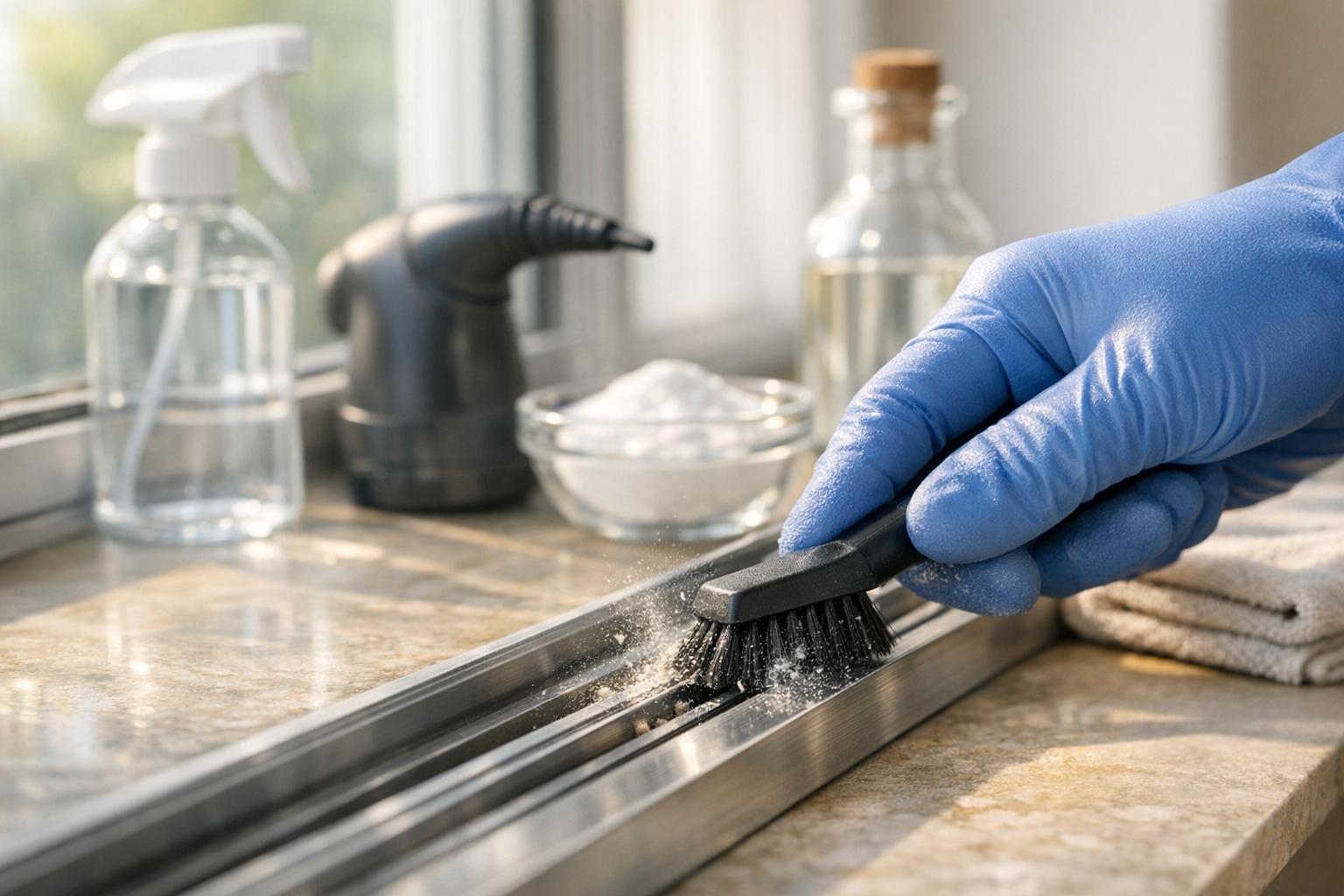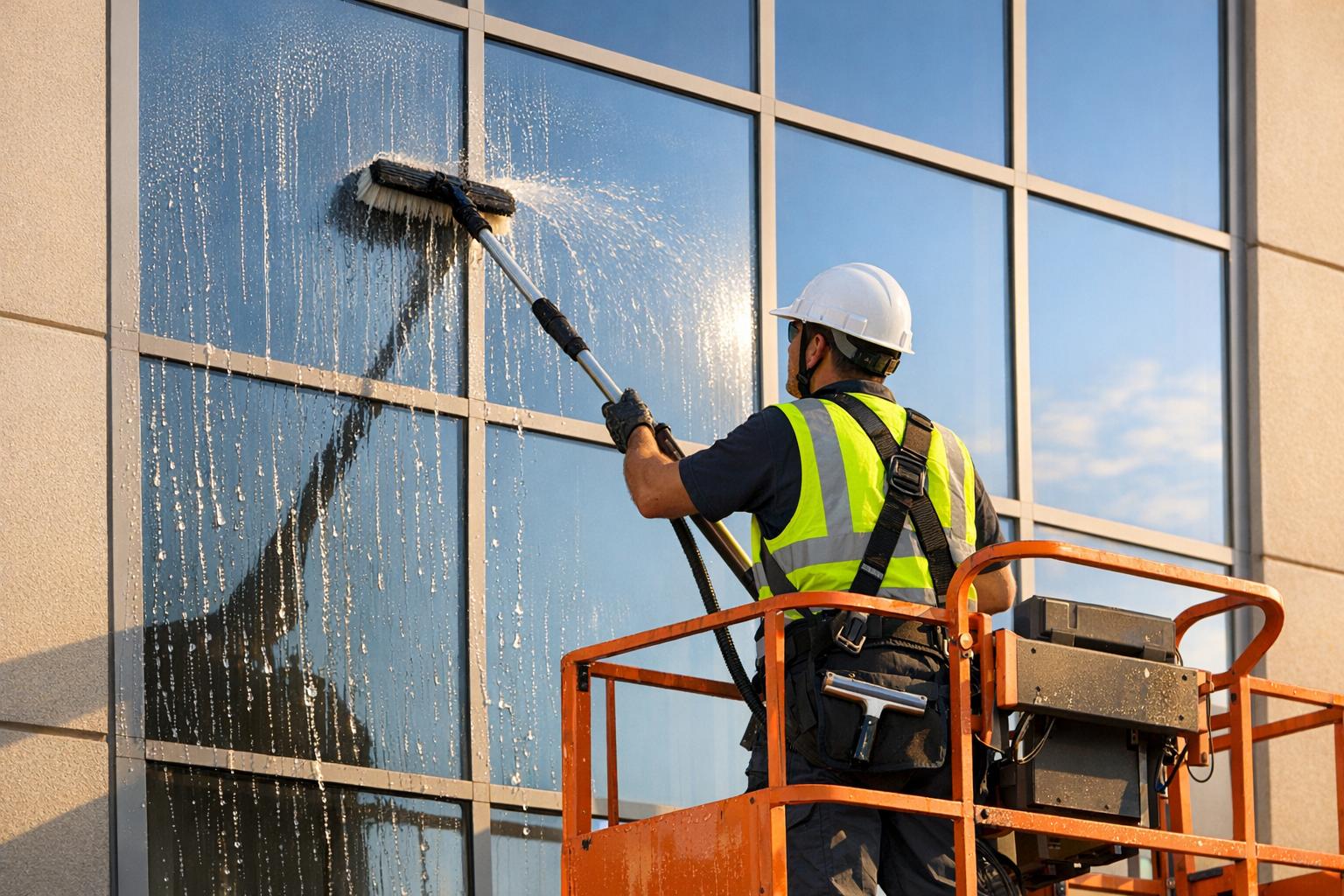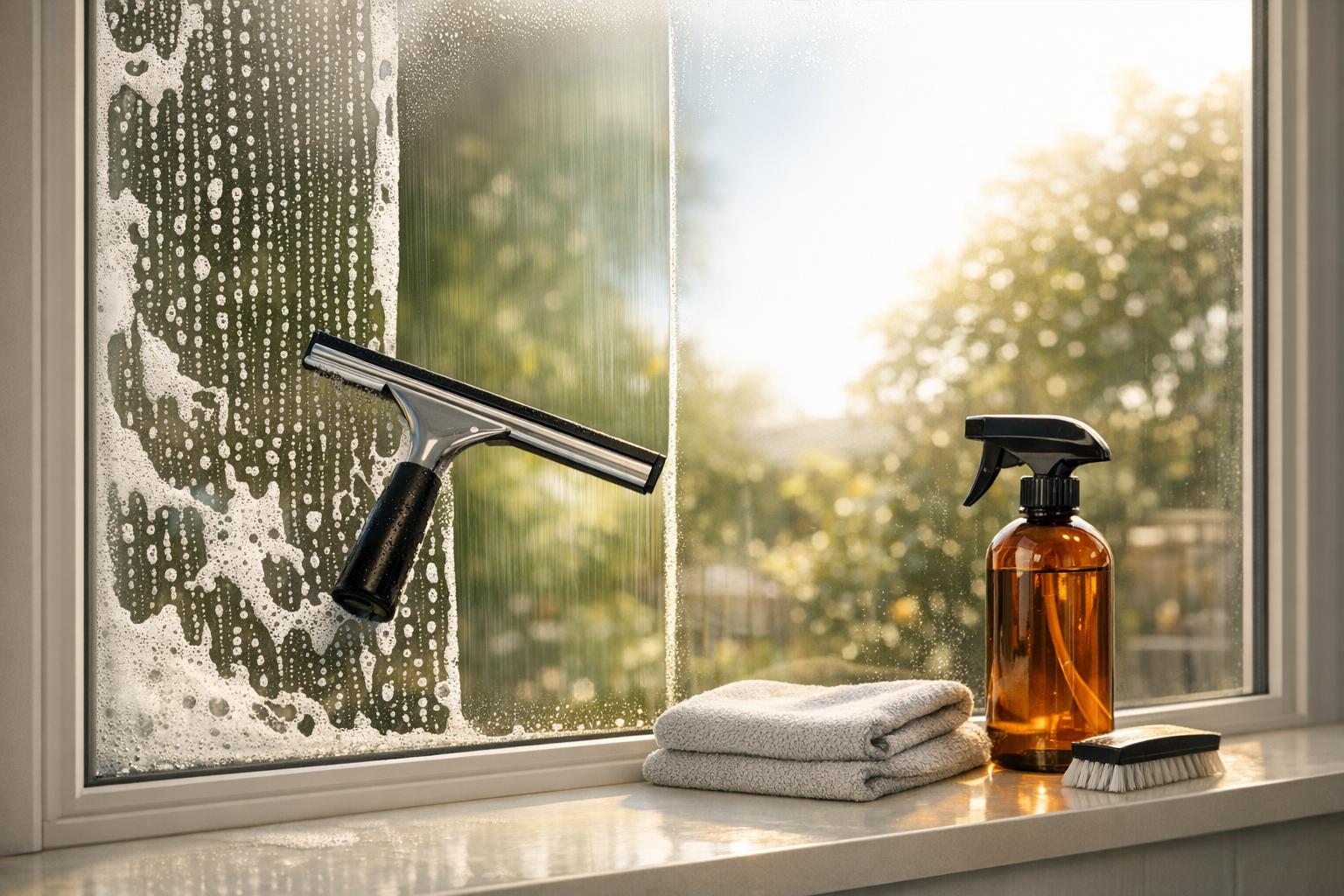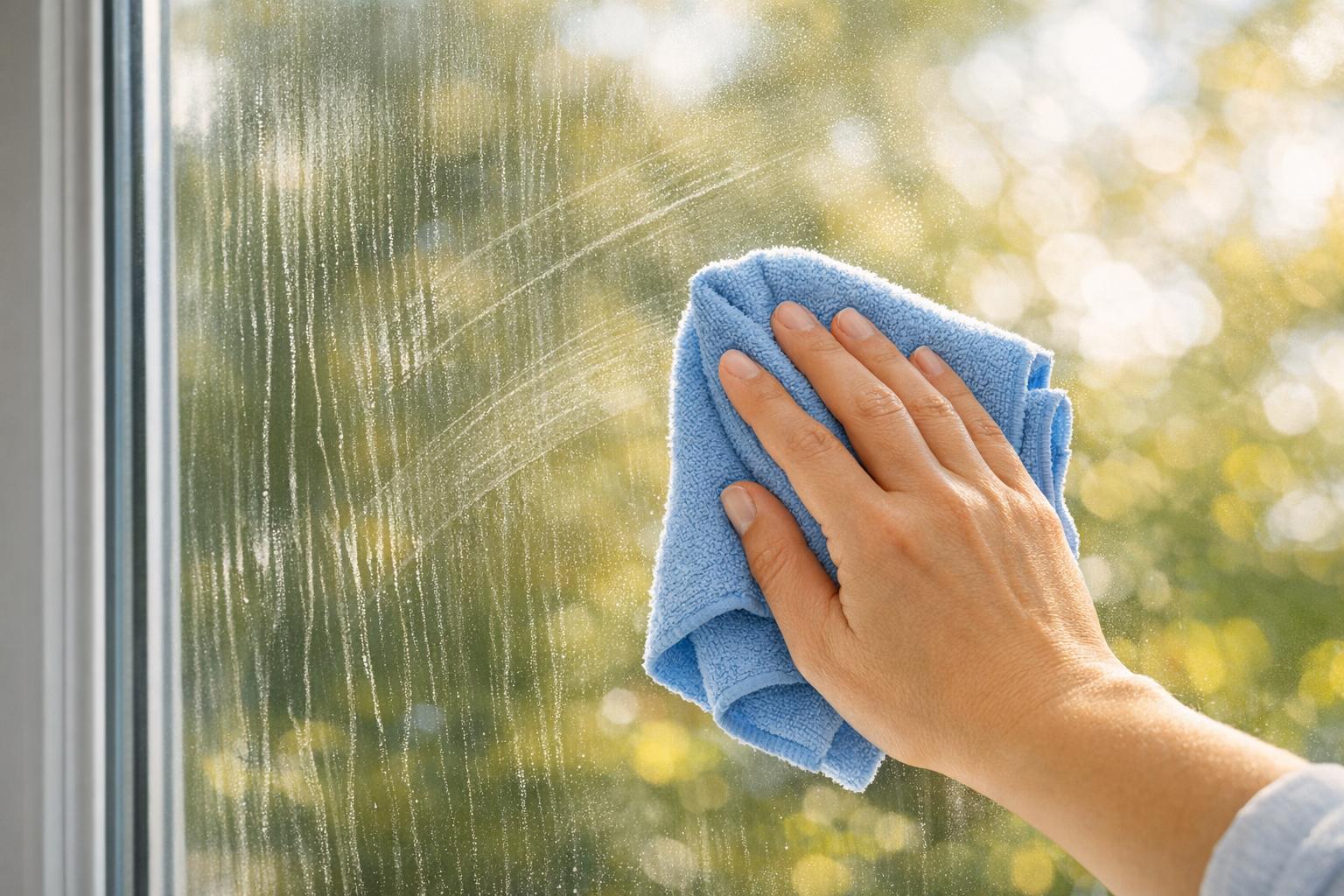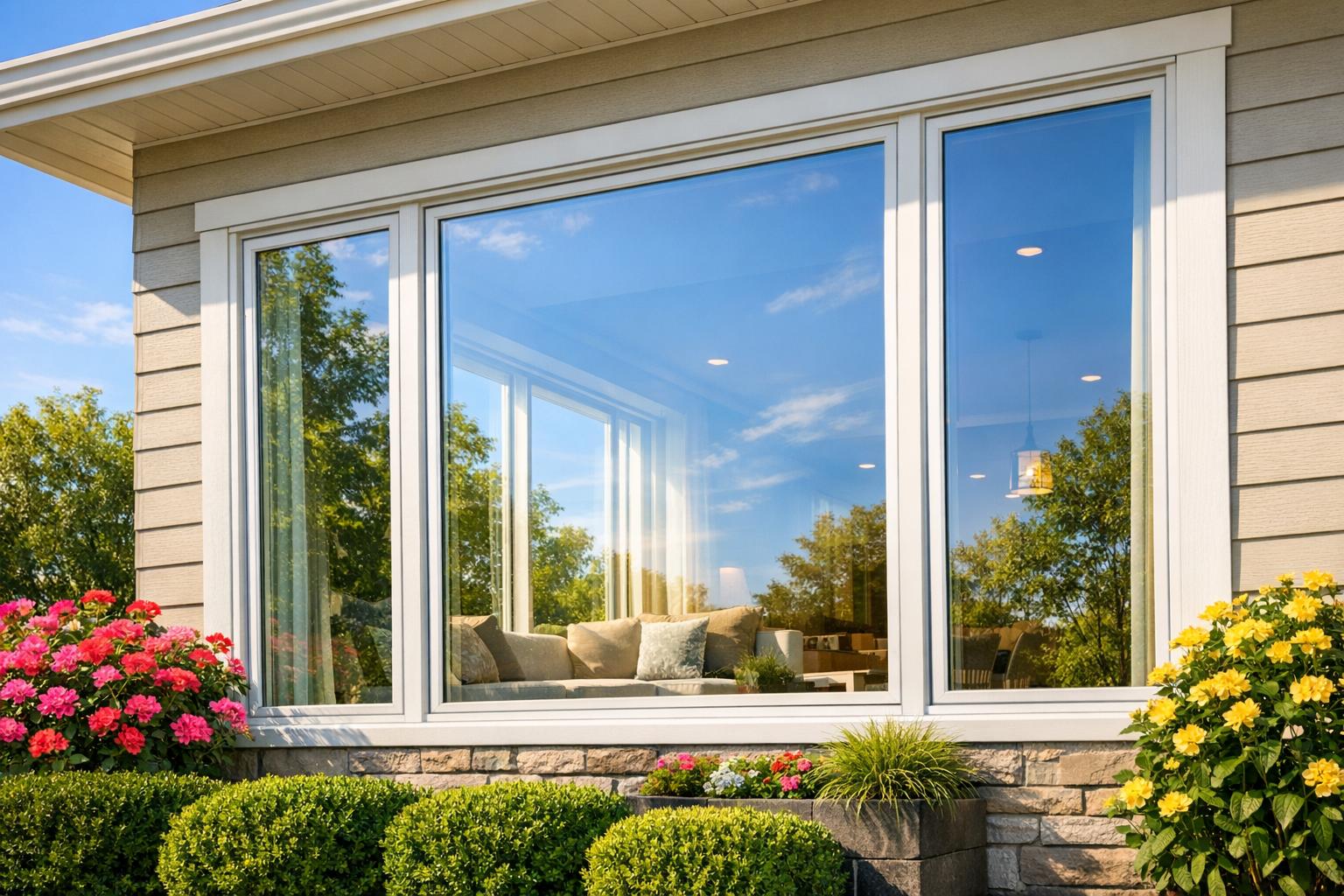Our Blog
Hard Water Stains: Causes and Solutions
Hard water stains are those stubborn white or gray marks on windows caused by mineral deposits like calcium and magnesium. These stains form when water evaporates, leaving minerals behind. Over time, they can etch into the glass, causing permanent damage if not addressed. Here’s what you need to know:
- Causes: Hard water from sprinklers, rain, or well water is the main culprit. Leaky gutters, roof runoff, and urban pollution worsen the problem.
- Removal: Light stains can be cleaned with vinegar, baking soda, or lemon juice. Tougher stains may require commercial cleaners or professional help.
- Prevention: Redirect sprinklers, repair gutters, and use hydrophobic coatings to protect windows. Regular cleaning and softened water can also reduce buildup.
Ignoring stains can lead to costly repairs or replacements, so act quickly to maintain your windows' clarity and longevity.
What Causes Hard Water Stains
Minerals in Hard Water
The main culprits behind those pesky white spots on your windows are calcium carbonate and magnesium carbonate. These minerals dissolve into water as it flows through underground deposits of limestone and chalk, which are common in many areas of the U.S.
When hard water lands on glass and evaporates, the water disappears, but the minerals stay behind, forming a chalky residue. Glass surfaces have tiny imperfections that allow these mineral deposits to cling and even etch into the surface over time. That’s why stained windows often feel rough to the touch when you run your finger over them.
The level of mineral concentration in water depends heavily on the geological makeup of your area. If you live in a region with significant limestone bedrock, you’re likely dealing with harder water and, consequently, more frequent window stains. These minerals set the foundation for other factors that can worsen the staining, as outlined below.
Common Sources of Hard Water
One of the most common culprits for hard water stains is sprinkler systems. These systems often use untreated water that’s packed with minerals. When the spray pattern isn't adjusted correctly, or wind blows the water onto nearby windows, it leaves behind a steady buildup of mineral deposits.
Rainwater can also contribute to the problem. It often carries minerals along with debris from roofing materials and urban pollution. When this contaminated runoff splashes onto windows, it deposits not only calcium and magnesium but also other unwanted particles.
Leaking gutters and roof runoff are another headache. They create concentrated streams of mineral-heavy water that repeatedly hit specific spots on your windows. Over time, this repetitive exposure accelerates stain buildup and can lead to etching if not addressed.
If your property relies on groundwater from wells for irrigation or cleaning, you’re likely dealing with even higher mineral concentrations. Well water tends to be harder than surface water, making it a frequent contributor to severe hard water stains.
Other Factors That Make Stains Worse
Beyond mineral deposits, environmental factors can take a manageable issue and turn it into a much bigger problem. Urban pollution adds a mix of contaminants like car exhaust, industrial smoke, pollen, and dust. When these combine with hard water, they create a grimy layer that’s far tougher to clean than simple mineral stains.
Then there’s the issue of screen burn. Aluminum window screens can corrode when exposed to moisture, producing oxides that transfer to the glass through rain and wind. These metal oxides bond with mineral deposits, forming stubborn stains that can permanently damage your windows.
Timing also plays a huge role. If windows aren’t cleaned regularly, mineral deposits have more time to harden and penetrate the glass surface. What might start as a harmless water spot can eventually turn into a permanent etch mark, requiring professional help - or even a full glass replacement.
Weather conditions can make things worse, too. Strong winds, heavy rains, and temperature swings all speed up mineral buildup and can undo your cleaning efforts in no time. That’s why consistent maintenance is key to keeping your windows clear and stain-free.
How To Remove Years Of Water Spot Stains On ANY Glass And Make It NEW AGAIN! BEST SOLUTION! DIY
How to Remove Hard Water Stains
Once you've identified the source of those stubborn white spots on your windows, it's time to tackle them with the right method. The approach you choose depends on how deeply the stains have set. Light, smooth stains can often be handled with simple DIY remedies, but tougher, older stains may require commercial products or even professional help.
DIY Solutions for Light Stains
For newer or less severe hard water stains, basic home remedies can work wonders:
- White vinegar solution: Combine equal parts white vinegar and water in a spray bottle. Spray the mixture directly onto the stains and let it sit for 5–10 minutes. The vinegar’s acidity helps dissolve the mineral deposits causing the spots. Afterward, wipe the area clean with a microfiber cloth to avoid scratching the glass.
- Baking soda paste: Mix baking soda with a little water to form a thick paste. Apply it to the stains, scrub gently with a non-abrasive pad, and rinse thoroughly.
- Lemon juice: Apply lemon juice directly to the stains, let it sit for a few minutes, and then wipe clean. For slightly tougher stains, use #0000 (super fine) steel wool. This grade is safe for glass when used gently - keep the surface wet and rub in small, circular motions to prevent scratches.
Always test any cleaning solution on a small, hidden area first, and never mix cleaning products. Wear gloves and ensure the space is well-ventilated when using any cleaning agents, even natural ones.
Commercial Cleaners for Stubborn Stains
If home remedies don’t do the trick, commercial hard water stain removers like Sorbo Hard Water Stain Remover or Titan A1 are designed for tougher jobs. These products contain stronger acids and other ingredients specifically formulated to break down hardened mineral deposits.
Follow the product instructions carefully. These cleaners are more powerful than DIY solutions, which also means they can cause damage if misused. Always wear gloves and eye protection, ensure good ventilation, and stick to the recommended contact time - don’t wipe too soon, but also avoid leaving the product on longer than advised. Once the stains are removed, rinse the surface thoroughly with clean water and dry with a microfiber cloth to prevent new spots from forming.
Even these commercial solutions have their limits. If stains persist or the glass shows signs of etching, professional help may be necessary.
Professional Services for Severe Stains
When stains feel rough, appear cloudy, or show signs of etching, it’s likely the deposits have penetrated the glass surface. At this stage, professional intervention is often the safest and most effective option. Improper cleaning attempts can make the damage worse, leading to scratches or further etching.
Professional window cleaning services use specialized polishing compounds and mechanical tools that can safely handle severe stains without harming the glass. They also have access to advanced chemical treatments designed for glass restoration - products that aren’t available for consumer use. If etching has occurred, professionals may use resurfacing techniques to restore much of the glass’s original clarity.
For example, Window Cowboy in Charlotte, NC specializes in removing hard water stains with advanced cleaning technology that keeps windows clear up to six times longer than standard methods. Customers like Cory Hymel noted that after three years without cleaning, their windows "looked brand new", while Audrey Snoor praised technician Austin for being "very thorough" and offering tips to prevent future stains.
"At Window Cowboy, we eliminate dirt, streaks, grime, and hard water stains, ensuring your windows sparkle like new - enhancing curb appeal, natural light, and the overall look of your property."
Professional window cleaning services typically cost $8 to $15 per window for standard cleaning, with additional charges for advanced stain removal. While this may seem like a higher upfront cost compared to DIY methods, it often saves money in the long run by avoiding repeated purchases of cleaning products - or worse, replacing damaged windows entirely.
sbb-itb-4ae7296
How to Prevent Hard Water Stains
Once you’ve mastered removing hard water stains, the next step is to prevent them from appearing in the first place. Considering that 85% of the United States has hard water, as reported by the U.S. Geological Survey, it’s clear that most homeowners can benefit from taking steps to protect their windows. Prevention not only saves time and effort but also helps avoid costly repairs or replacements caused by damage to the glass.
Regular Maintenance Tips
A few simple changes can go a long way in reducing your windows’ exposure to mineral-heavy water. For example, redirecting sprinklers so they don’t spray onto glass surfaces is a highly effective way to prevent stains. Many homeowners don’t realize that their irrigation systems might be regularly soaking their windows with water full of minerals, creating a perfect recipe for buildup.
Another key tip is repairing leaky gutters. When gutters overflow or have gaps, they can channel hard water directly onto your windows, repeatedly drenching the same spots and causing the most stubborn stains.
When it comes to cleaning, using filtered or softened water can make a big difference. Hard water is loaded with calcium and magnesium - minerals that leave behind those pesky stains. Installing a whole-home water softener, which ranges from $500 to $2,500, can help tackle the problem at its source. For a smaller investment, portable water filters designed for outdoor use can also reduce mineral deposits when washing windows.
Finally, drying windows thoroughly after cleaning or rainfall can prevent water droplets from evaporating and leaving behind residue. A clean microfiber towel, used while the glass is still damp, can stop stains before they form.
Protective Treatments for Long-Term Prevention
Thanks to modern advancements, there are now treatments designed to create a barrier between your windows and hard water. One popular option is hydrophobic coatings, which make water bead up and roll off the glass instead of spreading out and evaporating. These coatings typically cost $10 to $30 per bottle for DIY application and need to be reapplied annually. They also make cleaning much easier by reducing the chance of stains forming.
Another option is smart window films, which not only repel water but also provide extra benefits like UV filtering and glare reduction. While they’re more expensive than hydrophobic coatings, they last longer and offer additional features. Properly installed, these films can provide multi-year protection.
Both solutions work by changing how water interacts with the glass. Instead of water spreading out and evaporating slowly - leaving minerals behind - it forms droplets that roll off, taking the dissolved minerals with them. When paired with a consistent cleaning schedule, these treatments can significantly reduce the risk of hard water stains.
Regular Cleaning Schedule
Even with preventive measures in place, regular cleaning is essential to keep your windows free of mineral buildup. A consistent cleaning routine stops deposits from bonding to the glass. Experts recommend professional cleaning at least twice a year, or more frequently if your windows are exposed to sprinklers or heavy rain. Frequent cleaning removes minerals before they can cause permanent damage, such as etching.
Professional services, like Window Cowboy in Charlotte, NC, use advanced cleaning methods that can keep windows clear for up to six times longer than standard techniques. This extended protection reduces the need for frequent cleanings while ensuring your windows stay spotless. Their services also include cleaning window tracks to remove dust and debris, ensuring the entire window system remains in top shape.
The cost for professional window cleaning typically ranges from $150 to $350 for an average home, depending on factors like size and frequency. While this may seem like a moderate expense, it’s far more affordable than repairing or replacing damaged glass down the line.
| Prevention Method | Effectiveness | Initial Cost | Maintenance | Professional Required |
|---|---|---|---|---|
| Redirect sprinklers/Repair gutters | High | Low | Occasional | No |
| Filtered/softened water | High | $500–$2,500 | Ongoing | Optional |
| Hydrophobic coatings | High | $10–$30 | Annual reapplication | Optional |
| Professional cleaning schedule | Very High | $150–$350 per service | Every 6 months | Yes |
The best way to prevent hard water stains is by combining these strategies. By addressing the sources of water exposure, applying protective treatments, and sticking to a regular cleaning schedule, you can keep your windows looking pristine for years to come.
Final Thoughts
Hard water stains can quickly become a bigger problem if left untreated. With hard water affecting about 85% of U.S. households, knowing when to handle stains yourself and when to bring in professionals can save you both time and money.
Solutions for Tackling Hard Water Stains
The key to managing hard water stains is identifying their severity and choosing the right approach. For newer, lighter stains, DIY methods using white vinegar or baking soda are often effective. Vinegar works by breaking down calcium and magnesium deposits before they become permanent.
When dealing with older or more stubborn stains, commercial cleaners designed for mineral deposits can get the job done. Just be cautious during application to avoid scratching the glass.
Preventing stains in the first place can save you a lot of hassle. Simple steps like adjusting sprinkler heads, fixing gutters, or applying protective coatings can make a difference. Hydrophobic coatings, for example, create a barrier that helps water bead up and roll off, taking mineral deposits with it.
Routine cleaning is far cheaper than dealing with major repairs or replacing windows. But for severe cases, professional services offer solutions that go beyond what DIY methods can achieve.
The Case for Professional Services
While DIY methods are great for minor stains, professionals are the best choice for deeper or more advanced damage. They use specialized tools and commercial-grade products that outperform anything you can buy off the shelf. Plus, they can determine if stains have progressed from surface buildup to actual etching, which requires more intensive treatment.
Take Window Cowboy in Charlotte, NC, as an example. Their advanced cleaning techniques not only achieve streak-free windows but also keep them cleaner for up to six times longer than standard methods. This means fewer cleanings and better long-term savings for homeowners.
Beyond cleaning, professionals bring peace of mind. Licensed and insured experts can identify and address underlying issues like damaged window seals or screens that may be causing hard water buildup. Instead of just treating the symptoms, they tackle the root causes.
FAQs
What happens if hard water stains on windows aren’t removed?
If you let hard water stains linger, they can lead to permanent damage on your windows. The minerals in hard water can actually etch into the glass, leaving behind cloudy marks and reducing visibility. Over time, these stains can become so severe that replacing the windows might be the only solution.
Hiring professional cleaning services can make a big difference. They’re equipped to remove hard water stains effectively, bringing your windows back to their original condition and helping to avoid lasting damage. Staying on top of regular maintenance is the best way to keep your windows clear and protect your investment.
How do I know if I should hire a professional to remove hard water stains or try to clean them myself?
When deciding whether to tackle hard water stains yourself or call in a professional, it really comes down to the condition of the stains. Newer or lighter stains can often be managed with simple DIY solutions, like applying vinegar or a gentle cleaner. But when it comes to older, more stubborn, or widespread stains, professional help might be your best bet to avoid damage and achieve a thorough clean.
If you're unsure or want flawless, streak-free windows, professional services - like those offered by Window Cowboy - are equipped with advanced tools and techniques to handle even the most challenging stains. They’ll leave your windows looking spotless and help them stay cleaner longer.
What are some affordable ways to prevent hard water stains on windows?
Preventing hard water stains on your windows doesn’t have to break the bank. The key lies in consistent upkeep. One effective approach is installing a water softener. By lowering the mineral content in your water, it minimizes the deposits that lead to those stubborn stains. Another handy tip? Use a water-repellent coating on your windows. This creates a barrier that helps water slide off smoothly, cutting down on residue buildup.
You can also take a quick, proactive step after it rains - grab a squeegee or a microfiber cloth and wipe down your windows. This simple habit prevents minerals from drying on the glass, keeping stains at bay and sparing you the hassle of deep cleaning later on.






